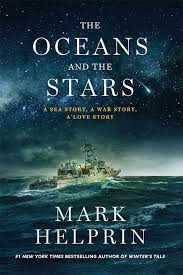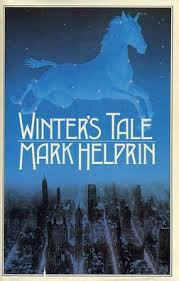Current Reading: The Oceans and the Stars by Mark Helprin
I haven’t actually read this all the way through. It’s going to take a while for me to get through it because I don’t have a lot of time for reading, but it’s both good and interesting, so I thought, you know what, maybe I won’t wait till I’ve finished it, maybe I’ll mention this book now.

Just a few days ago, I saw something about this book, The Ocean and the Stars, and thought in surprise: Why have I never looked to see what else Mark Helprin has written? I mean, why did this never even occur to me?
I actually know why: It’s because I read A Winter’s Tale when I was in high school or thereabouts and that was long, long before you could hop on the internet and check out an author’s page on Amazon. [Pausing here to regret that I didn’t buy Amazon stock in 1998. Alas!] Anyway, that’s why. But it never occurred to me to check when I re-read A Winter’s Tale later, either, and I do wonder why not. Turns out Helprin has written a fair number of books, with The Oceans and the Stars being the most recent. It came out last October, it’s got 1200 or so ratings at Amazon and a 4.6 average star rating. Here’s the description:
Mark Helprin, the #1 New York Times bestselling author of Winter’s Tale and A Soldier of the Great War, presents a fast-paced, beautifully written novel about the majesty of the sea; a life dedicated to duty, honor, and country; and the gift of falling in love.
A Navy captain near the end of a decorated career, Stephen Rensselaer is disciplined, intelligent, and determined to always do what’s right. In defending the development of a new variant of warship, he makes an enemy of the president of the United States, who assigns him to command the doomed line’s only prototype––Athena, Patrol Coastal 15––with the intent to humiliate a man who should have been an admiral.
Rather than resign, Rensselaer takes the new assignment in stride, and while supervising Athena’s fitting out in New Orleans, encounters a brilliant lawyer, Katy Farrar, with whom he falls in last-chance love. Soon thereafter, he is deployed on a mission that subjects his integrity, morality, and skill to the ultimate test, and ensures that Athena will live forever in the annals of the Navy.
As in the Odyssey, Katy is the force that keeps him alive and the beacon that lights the way home through seven battles, mutiny, and court martial. In classic literary form, an enthralling new novel that extolls the virtues of living by the laws of conscience, decency, and sacrifice, The Oceans and the Stars is nothing short of a masterpiece.
***
To which my response is: Fast paced, huh? I definitely have doubts about that. But I believe the rest of this description is probably true. I picked up a sample immediately. I though I would add it to the list of books to read after I eventually finish SILVER CIRCLE, but I actually started reading it (slowly), so let me tell you about it.
Here is the first page of The Oceans and the Stars. This is a prologue.
***
Snow falling upon water makes a sound so close to silence that no heart exists it cannot calm. It fell across the Chesapeake and in the harbors and inlets and far out to sea, surrendering to the waters with the slightest exhalation and a muffled hiss. Though few are there to see it, in winter this happens often.
In the construction and maintenance of warships in Virginia’s Tidewater, now veiled in steady snow, engines throbbed, cranes swivelled, and barges plodded over black waters. The spacious anchorage of Hampton Roads is ringed by naval stations, air bases, and shipyards making up the largest concentration of naval might in existence. Interwoven with civilian cities and commercial waterways, this sinew of steel is a world of its own. Even so, its powerful present cannot overwhelm images that upwell from the past: the sails of the French fleet in surprising bloom off Yorktown; the Monitor battling the Merrimack; and within living memory the Battle of the Atlantic, when ships burned offshore and corpses washed up on the sand.
From these docks and quays millions left for the World Wars, half a century of cold War, Korea, Vietnam, and the Middle East. And for the scores of thousands who did not return, the flat coast of Virginia was the last they would ever see of their country. In summer and from war to war, as their ships passed by, young sailors would fall in love with girls on the beaches even though they could hardly see them.
None of this can be erased. Absorbed in their tasks, people do forget, but ofttimes spectral images suddenly appear. Across the water in the vast shipyards, cascades of sparks rooster-tail from the darkness of a cavernous shed or beside a massive hall. As if descended from the flash of guns, they seem to escape the underworld so as to insist upon the eternal presence of battle. And a warship heading out, as in uncountable times before, can arrest a watcher onshore as the ship speeds toward harm’s way across the world and far from home.
***
I realize I’m biased because of A Winter’s Tale, but I was hooked by that first couple of sentences about snow falling into water. The prologue is just about twice as long as the bit I posted above. What is this prologue doing? It is establishing atmosphere. That’s what it’s doing. It’s also setting up a tense situation way in the future. The story is going to be an extremely extended flashback that will circle around to the moment captured in this prologue; then the story will completed in that moment, in an epilogue. I haven’t read the epilogue yet, but I’m certain that’s going to be the structure.
Regardless, for once the prologue barely matters. I’m willing to follow Helprin into this novel no matter how he starts it. But that first paragraph about snow didn’t hurt either. I never personally highlight when reading, but you know what? I highlighted that paragraph. I’m not alone. Popular highlights shows me that 88 people have highlighted that paragraph.
Snow falling upon water makes a sound so close to silence that no heart exists it cannot calm. It fell across the Chesapeake and in the harbors and inlets and far out to sea, surrendering to the waters with the slightest exhalation and a muffled hiss. Though few are there to see it, in winter this happens often.
I mean, that is lovely.
I’m thirteen percent of the way through the book, I’m highlighting especially beautiful passages or striking lines, and so far I’ve highlighted seven such passages and lines. Which is a lot, considering that, as I just said, I don’t generally highlight at all. But these are passages that either I want to come back to and admire, or they are examples of writing craft that I might want to pull out and used to illustrate a post sometime, or both.
The sea was speaking to him in silence. Its message was: as your spirit rises to fill the place of appetites and illusions, take stock and be comforted, for all time is lost in the oceans and the stars. You’ve left behind the things of life on land that shield you from a truth the sea will not let you forget — that you are first and last a spirit, that you are alone, and that this can be borne.
Wow.
Also, next time I’m doing a post on telling vs showing, I will remember this book. SO MUCH TELLING. And very beautiful and effective telling it is, too. This novel could be used to illustrate telling, properly handled. I sort of think I’ve referred to A Winter’s Tale in that context too.
If I were teaching a class about novels and the craft of novels, Helprin would be a good choice for discussing (a) telling vs showing and how to use both effectively; (b) how to use telling to establish setting, which is customary; and character, which is something that draws finger-wagging from hither and yon, so a counter example would be good; (c) how to establish atmosphere; (d) how to use a prologue and epilogue to frame a story; (e) how to write poetically; and (f) how to write with power. The paragraph I highlighted is poetic and powerful.
I’m going to do a post soon about powerful writing. This book is going to provide one example.
Meanwhile! If you, like me, are thinking, OMG, JULY, UGH, I HATE HEAT, LET’S HAVE WINTER, then let me remind you all that the Ur-Winter Novel is indeed A Winter’s Tale. There’s no other book in the world that can compare for making readers long for snow.
 Please Feel Free to Share:
Please Feel Free to Share:







The post Current Reading: The Oceans and the Stars by Mark Helprin appeared first on Rachel Neumeier.
 newest »
newest »
 Oh my gosh, I might have to give this one a whirl! And it takes place where I live. My husband (retired Navy) works at one of those shipyards :)
Oh my gosh, I might have to give this one a whirl! And it takes place where I live. My husband (retired Navy) works at one of those shipyards :)



